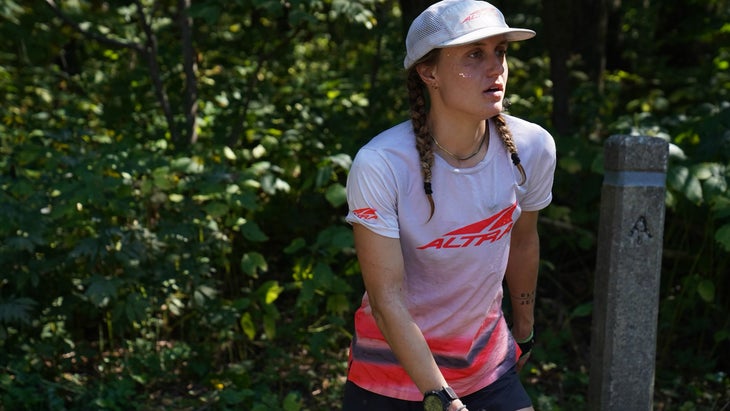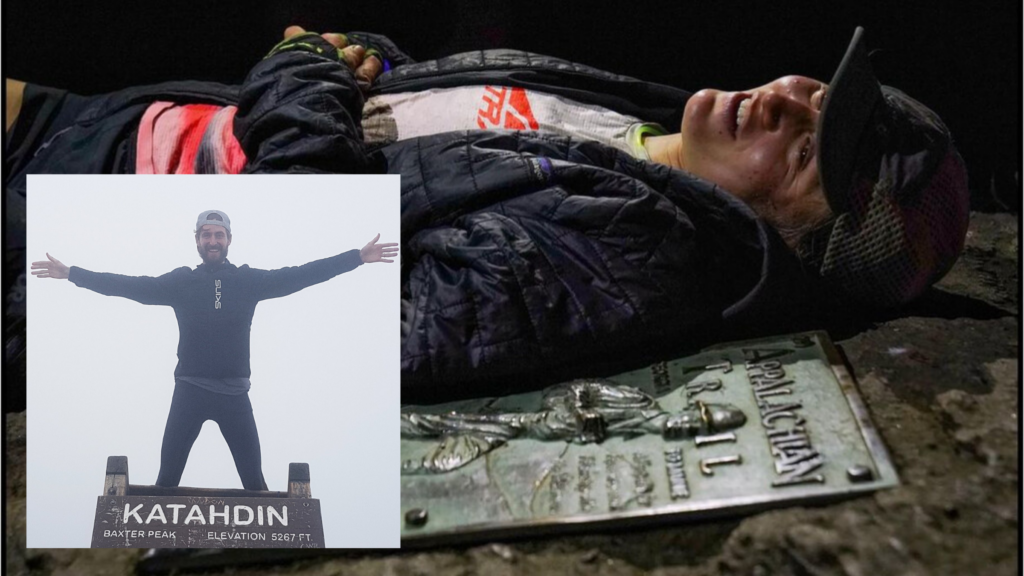“], “filter”: { “nextExceptions”: “img, blockquote, div”, “nextContainsExceptions”: “img, blockquote, a.btn, a.o-button”} }”>
New perk: Easily find new routes and hidden gems, upcoming running events, and more near you. Your weekly Local Running Newsletter has everything you need to lace up!
>”,”name”:”in-content-cta”,”type”:”link”}}”>Subscribe today.
When a Belgian dentist named Karel Sabbe smashed the Appalachian Trail FKT by four days in 2018, many thought his mark of 41 days, 7 hours, and 39 minutes was so stout that it would last for a lifetime.
Many were wrong. As you’ve probably heard by now, Tara Dower blew his Fastest Known Time out of the water this summer with her sub-41 day effort.
To do so, she had to tackle more than 56 miles per day over the largely technical 2,190-mile trail that runs the length of the Appalachian Mountains from Maine to Georgia. What’s more, the 31-year-old from Virginia Beach, Virginia, made history less than a month after taking fourth place at the Hardrock 100.
Dower’s performance is already being dubbed FKT of the year, even the FKT of all time. It’s a rare ultra-endurance feat to break through the small community bubble, garnering props from the likes of tennis legend Billie Jean King.
But one of the first to congratulate Dower was none other than Sabbe himself, who in addition to setting the AT FKT broke the FKT on the Pacific Crest Trail in both 2016 and 2023, and is just one of 20 to finish the infamous Barkley Marathons.
It’s a full-circle moment for Dower, who considers herself a student of Sabbe. We caught up with Sabbe to find out what he thinks about Dower taking down his legendary mark.
What are your overall thoughts on Tara setting a new FKT on the AT?
I was inspired by the way Tara approached it and by the way she moved forward relentlessly. She did it silently but with purpose and it is inspiring to see a feat like that.
What does this mean to you after holding the record for six years?
The way it was broken means a lot to me—who is it? How is the person involved in the community and what was his/her mindset? Since Tara loves, cherishes, and respects the Appalachian Trail in such a way, it makes me happy to pass on the record / fastest known time to such a person.
Feet on the ground (or in the dirt) and with a lot of grit. She had to dig deep to set the record and it is so well deserved.
What do you think of Tara’s come-from-behind strategy?
It was definitely smart to approach it this way. I think there has been some ‘misunderstanding’ about how far she was behind record pace, as some people were comparing her southbound stats to my northbound stats, but running the first seven days through Georgia, North Carolina, etc. is not comparable to Maine and New Hampshire.
I think comparing apples to apples, her southbound pace was slower than my “reversed” pace, but how far she was behind wasn’t as extreme as some people mentioned.
I was really surprised by her “rather be the hunter than the hunted” mindset and it makes a lot of sense to approach it that way. I also love how events that possibly made it more difficult (getting into Hardrock, having to go southbound instead of what was initially planned as a northbound record attempt) gave her more energy rather than more doubts.
She realized that if she was going southbound, she could become the hunter, and she also didn’t postpone the record attempt to 2025 because of Hardrock, which is what many people would have done. She just thought about it, got a bit scared and excited at the same time (I think) and did superbly on both events.

What does it mean for the sport to not only see your record broken, but a woman taking the overall crown?
I was happy that it was proven yet again that women are super strong in our sport (something I have always been a firm believer of). They are as strong, if not stronger, because they can endure pain better and take suffering and sleep deprivation better often, than their male counterparts.
The way I see it is that I “need” long FKTs in order to compete with pro runners (I’m not a pro runner) is a comparable thought that can be made for female athletes. The shorter the distance, the less chance I have to beat pro runners who can train more, rest more, etc. The shorter the distance, the more chance that men will be faster and stronger than women (this is just a physiological and anatomical reality—see marathons, 100-meter and 200-meter sprint times, etc.).
Yet as the distances go up and the mental part becomes more and more important, the difference between pro and amateur runners, but also between men and women, becomes smaller and eventually negligible.
The real thing that I would like to see happen in the future is that a woman setting a record like this, doesn’t create such a “shock wave” through the community anymore. That we are at the point where we genuinely realize, accept and just know that it makes sense that a woman does this and that it shouldn’t be surprising. Inspiring events like what Tara did, what Jasmin Paris did (at the Barkley Marathons this year), what Courtney Dauwalter did (with the Moab 240 in 2017 or winning Western States, Hardrock, and UTMB in 2023), help to come to this point in the future.
Any final thoughts you’d like to share?
She called herself a student of Karel Sabbe, having listened to many podcasts and reading a lot of race reports to get to know and understand my approach and mindset. If that is how she calls herself, I would call myself a proud “teacher” if that is what comes of it. She took a lot of advice from what I had experienced but made it her own story and elevated it all to the next level. Incredible.
